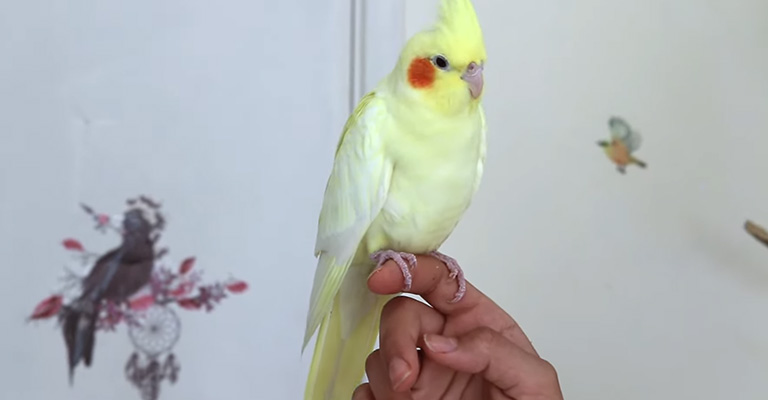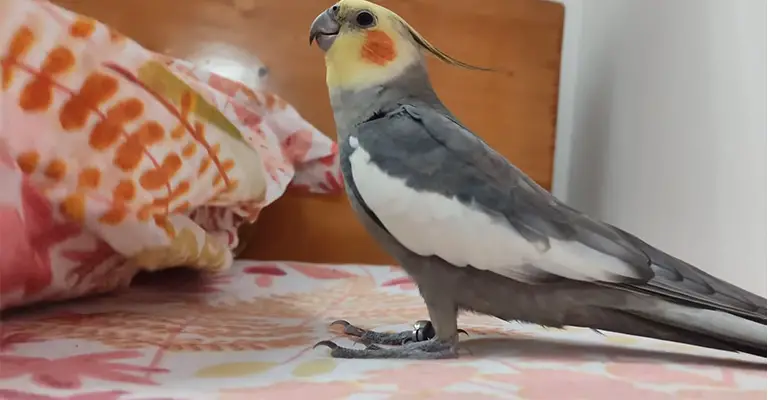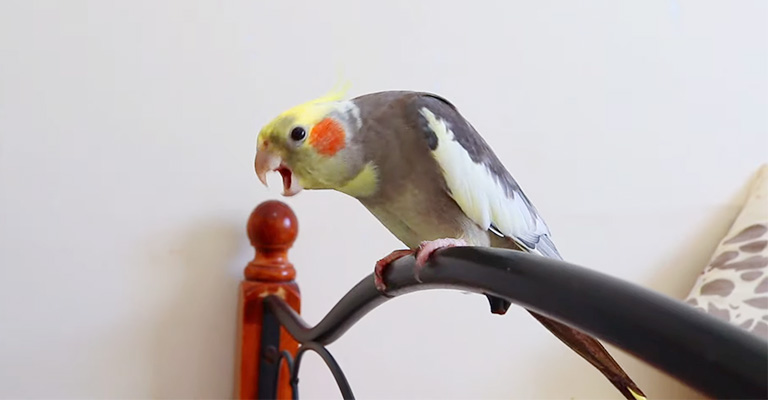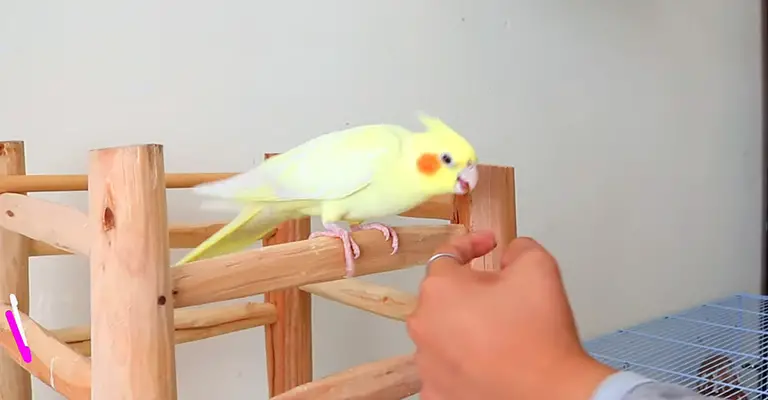Cockatiels are popular pet birds known for their playful nature, beautiful plumage, and charming personalities. As responsible bird owners, it is essential to monitor their health and well-being closely.
One common concern that bird owners may have is when they notice their cockatiel’s feet feeling cold. While it may seem like a minor issue, cold feet in cockatiels can indicate underlying health problems or environmental factors that need attention.
In this article, we will explore the possible reasons why your cockatiel may have cold feet and what you can do to address the issue.

Why Does My Cockatiel Have Cold Feet?
Here are the reasons why your pet bird might get cold feet:
Temperature Regulation
Birds, including cockatiels, have a higher body temperature than humans. Their normal body temperature ranges between 104-108 degrees Fahrenheit (40-42 degrees Celsius).
To maintain this temperature, birds have a unique adaptation in their feet called “countercurrent heat exchange.”
This mechanism allows them to regulate their body temperature by controlling the blood flow to their extremities. When a cockatiel’s feet feel cold to the touch, it could be an indication that its body is trying to conserve heat by reducing blood flow to the feet.
Cold Environment
One of the most common reasons for a cockatiel’s cold feet is exposure to a cold environment. Cockatiels are native to the warm regions of Australia, and they are not well-suited to cold temperatures.
If your cockatiel’s cage is placed near a drafty window or in a room with low temperatures, it can lead to cold feet. Ensure that your bird’s cage is located in a warm and draft-free area of your home, away from air conditioning vents or open windows.
Cage Flooring
The type of flooring in your cockatiel’s cage can also affect their feet’ temperature. Wire or metal cage floors can feel cold to the touch and may cause discomfort to your bird.
Consider providing a layer of soft bedding or using cage liners made of materials like fleece or paper towels to provide insulation and warmth. This will help prevent your cockatiel’s feet from getting cold.
Poor Blood Circulation
Cold feet in cockatiels can also be a sign of poor blood circulation. Several factors can contribute to this, including obesity, lack of exercise, or underlying health conditions.
Obesity can put pressure on blood vessels, restricting blood flow to the extremities. Ensure that your cockatiel is on a balanced diet and provide opportunities for exercise outside of the cage, such as supervised flight time or interactive toys.
Illness or Infection
In some cases, cold feet in cockatiels can be a symptom of an underlying illness or infection. Respiratory infections, such as pneumonia or sinusitis, can cause a decrease in blood flow to the feet, resulting in cold feet.
Other signs of illness may include lethargy, loss of appetite, sneezing, or discharge from the eyes or nostrils. If you suspect that your cockatiel is unwell, it is crucial to consult a veterinarian who specializes in avian medicine for a proper diagnosis and treatment.
Stress or Anxiety
Stress and anxiety can also affect a cockatiel’s body temperature and blood circulation. Cockatiels are sensitive birds, and changes in their environment or routine can cause stress.
Loud noises, sudden movements, or the presence of unfamiliar people or animals can all contribute to stress in cockatiels. Ensure that your bird’s environment is calm and predictable, and provide plenty of mental stimulation and enrichment to help alleviate stress.
Dehydration
Dehydration can affect a cockatiel’s overall health and body temperature regulation. When a bird is dehydrated, it can lead to poor blood circulation and cold feet.
Ensure that your cockatiel always has access to fresh, clean water. Monitor their water intake and consult a veterinarian if you suspect dehydration.
Age and Aging
As cockatiels age, their bodies may become less efficient at regulating temperature. Older birds may be more prone to feeling cold, especially if they have underlying health conditions.
Regular veterinary check-ups are essential for senior cockatiels to monitor their overall health and address any age-related concerns.
What to Do If Cockatiel Has Cold Feet?

If you notice that your cockatiel has cold feet, there are several steps you can take to address the issue:
Check the Temperature
Ensure that the temperature in your bird’s environment is within the recommended range for cockatiels, which is around 70-80 degrees Fahrenheit or 21-27 degrees Celsius. If the room is too cold, consider using a space heater or adjusting the thermostat to provide a warmer environment.
Provide a Warm and draft-Free Area
Place your cockatiel’s cage in a warm and draft-free area of your home. Avoid placing the cage near windows, air conditioning vents, or areas with fluctuating temperatures. This will help prevent cold drafts from affecting your bird’s feet.
Use Cage Liners or Soft Bedding
Provide insulation and warmth for your bird’s feet by using cage liners made of materials like fleece or paper towels. These materials can help retain heat and provide a comfortable surface for your cockatiel to perch on.
Encourage Exercise
Lack of exercise can contribute to poor blood circulation, which may result in cold feet. Encourage your cockatiel to exercise by providing opportunities for them to stretch and move around outside of the cage. Supervised flight time or interactive toys can help keep your bird active and promote better circulation.
Ensure a Balanced Diet and Hydration
A healthy diet is crucial for overall bird health, including proper circulation. Ensure that your cockatiel is on a balanced diet that includes a variety of fresh fruits, vegetables, high-quality pellets, and occasional treats.
Additionally, make sure your bird has access to fresh, clean water at all times to prevent dehydration, which can affect blood circulation.
Monitor Behavior and Overall Health
Keep an eye on your cockatiel’s behavior and overall health. If you notice any other signs of illness, such as lethargy, loss of appetite, or respiratory issues, it is important to consult a veterinarian who specializes in avian medicine. They can conduct a thorough examination and provide appropriate treatment if necessary.
Remember, each cockatiel is unique, and it may take some trial and error to find the best solutions for your bird’s comfort. If the issue persists or worsens despite your efforts, seeking professional advice from a qualified avian veterinarian is always recommended.
Is Cold Feet a Sign of Illness?

Cold feet in cockatiels can sometimes be a sign of an underlying illness or health issue. While it is not always the case, it is important to monitor your bird for any other signs of illness or discomfort.
Cold feet alone may not necessarily indicate a serious problem, but when combined with other symptoms, it could be a cause for concern.
If your cockatiel exhibits additional signs such as lethargy, loss of appetite, respiratory issues (such as sneezing, coughing, or difficulty breathing), discharge from the eyes or nostrils, or any other abnormal behavior, it is advisable to consult a veterinarian who specializes in avian medicine.
These professionals can conduct a thorough examination, perform diagnostic tests if needed, and provide appropriate treatment for any underlying health conditions.
It is crucial to pay attention to changes in your cockatiel’s behavior, as birds are known to hide signs of illness until they become more severe. Early detection and prompt veterinary care can greatly improve the chances of successful treatment and recovery.
Therefore, if you have any concerns about your cockatiel’s health, it is always best to seek professional advice from a qualified avian veterinarian.
The Temperature of a Bird’s Feet

The temperature of a bird’s feet can vary depending on various factors, including the bird’s species, the surrounding environment, and the bird’s overall health. Here are different types of temperature variations in a bird’s feet and their potential implications:
Normal Temperature
A bird’s feet typically have a slightly lower temperature than its core body temperature. The normal body temperature of most birds, including cockatiels, ranges between 104-108 degrees Fahrenheit (40-42 degrees Celsius).
The feet may feel slightly cooler to the touch, but they should not be excessively cold or show signs of discomfort. Normal temperature indicates that the bird’s thermoregulation is functioning properly.
Cold Feet
If a bird’s feet feel noticeably colder than the rest of its body, it may indicate that the bird is trying to conserve heat by reducing blood flow to the extremities. Cold feet can be a natural response to colder environments or a way for the bird to regulate its body temperature.
However, if the feet feel excessively cold or the bird shows signs of discomfort, it could be a sign of poor circulation, stress, illness, or environmental factors that need attention.
Warm Feet
Occasionally, a bird’s feet may feel warmer than usual. This can be due to increased blood flow to the extremities, which may occur during periods of activity or when the bird is trying to dissipate excess body heat.
Warm feet can also be a sign of inflammation or infection, especially if the bird shows other symptoms such as redness, swelling, or discomfort. If the warmth persists or is accompanied by abnormal behavior, it is advisable to consult a veterinarian.
Hot Feet
If a bird’s feet feel excessively hot to the touch, it may indicate a problem with thermoregulation or an underlying health issue. Hot feet can be a sign of fever, inflammation, infection, or metabolic disorders.
If the bird’s feet feel abnormally hot and the bird shows signs of illness, such as lethargy, loss of appetite, or respiratory distress, immediate veterinary attention is recommended.
It is important to note that the temperature of a bird’s feet alone may not provide a definitive diagnosis of a health condition. Other symptoms, behavior changes, and a thorough examination by a qualified avian veterinarian are necessary to determine the underlying cause and provide appropriate treatment.
If you have concerns about the temperature of your bird’s feet or notice any other abnormal signs, it is best to consult a veterinarian who specializes in avian medicine. They can provide a comprehensive evaluation and offer the necessary guidance or treatment for your bird’s well-being.
FAQs
You can check your cockatiel’s feet by gently touching them with your hand. If they feel noticeably colder than the rest of their body, it may indicate that their feet are cold.
While cold feet in cockatiels can be caused by various factors, it is essential to monitor your bird for any other signs of illness or discomfort. If your cockatiel exhibits other symptoms such as lethargy, loss of appetite, or respiratory issues, it may indicate a more serious health problem. In such cases, it is advisable to consult a veterinarian.
To keep your cockatiel’s feet warm in a cold environment, ensure that its cage is placed in a warm and draft-free area of your home. You can also provide insulation by using cage liners or soft bedding materials.
Yes, stress and anxiety can affect a cockatiel’s body temperature and blood circulation, potentially leading to cold feet. It is important to create a calm and predictable environment for your bird, minimizing loud noises and sudden changes.
If your cockatiel’s cold feet persist despite addressing environmental factors and providing appropriate care, or if you notice any other concerning symptoms, it is advisable to consult a veterinarian who specializes in avian medicine.
Bottom Line
That was all about why does my cockatiel have cold feet. Cold feet in cockatiels can be a sign of various underlying factors, including temperature regulation, environmental conditions, poor blood circulation, illness, stress, or dehydration.
By understanding the possible causes and taking appropriate measures, you can help ensure the well-being and comfort of your beloved cockatiel.
Remember, if you have any concerns about your bird’s health, it is always best to seek professional advice from a qualified avian veterinarian.